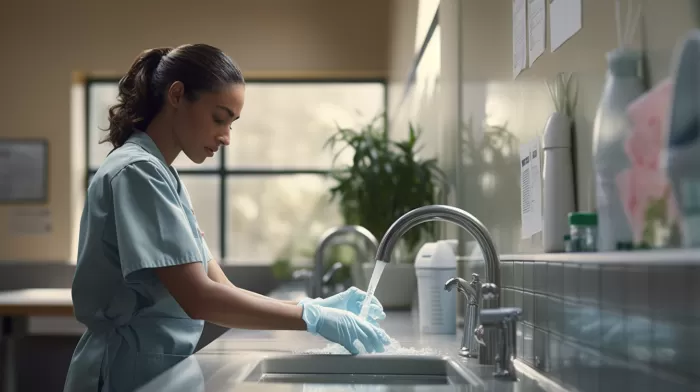When lying in a hospital bed, the last thing you want to worry about is risking infection from the very place that’s supposed to heal you. Yet, there’s a significant risk of contracting an infection while in the hospital that you didn’t have before being admitted. There is, however, a way to reduce the danger by being vigilant and proactive about hand-washing practices by healthcare workers attending your bedside.
The Importance of Hand-Washing
Hand hygiene is crucial in hospitals for reducing the risk of picking up pathogens that might make you sick. To lower your chances of contracting an infection, it’s essential to ensure that nurses, attendants, and even doctors wash their hands before they touch you or do anything in your room. Studies have shown that as the day progresses, healthcare workers’ hand hygiene habits tend to decline, especially near the end of their shifts.
A University of Pennsylvania study analyzed the hand-washing practices of 4,157 caregivers in 35 hospitals over three years. Researchers found that “hand-washing compliance rates” dropped almost 9% from the beginning to the end of a 12-hour shift. Workers who were particularly busy demonstrated an even more significant hand-washing decline.
The Role of Mental Fatigue
The continuous exercise of cognitive resources, such as self-control and decision-making, often leads to mental fatigue. After numerous hours of nonstop decision-making, healthcare workers show a subsequent decline in their capacity to regulate behavior, desires, and emotions, resulting in a lax approach to proper hand-washing procedures.
In the study, 65% of the workers were nurses, followed by patient care technicians (12%), therapists (7%), doctors (4%), and a few others. For every percentage drop in hand-washing, the number of infections increased by 3.9 per 1,000 patients.
Taking Charge of Your Care
Ensuring that healthcare professionals who enter your room practice proper hand hygiene is a simple yet effective way of safeguarding against infections. Don’t be afraid to remind them to wash their hands or utilize hand sanitizer upon entering your room.
Here are a few additional things you can do to reduce the risk of infection during your hospital stay:
- Maintain personal hygiene: Just as healthcare professionals should maintain proper hand hygiene, patients should also remember to clean their hands frequently and practice good general hygiene.
-
Educate yourself: Learn about possible infections related to your particular medical procedures or conditions. The Centers for Disease Control and Prevention (CDC) offers resources to help you understand possible infection risks and steps to prevent them.
-
Be an advocate: Make sure you and your visitors follow the same hand-washing protocols that hospital staff are expected to uphold. If you have any questions or concerns, don’t hesitate to bring them up with a nurse or doctor.
-
Keep an eye on dressings and medical equipment: Be alert to any changes in catheters, intravenous tubes, and wound dressings. If they’re soiled, loose, or not functioning correctly, notify a nurse promptly.
-
Get vaccinated: Follow CDC vaccination recommendations for adults and children to help prevent infections that can lead to hospital stays.
By being proactive about hand-washing and taking charge of your healthcare, you can significantly reduce the risk of infection during your hospital stay. Stay vigilant and remember the importance of proper hand hygiene for yourself and those tasked with your care.



